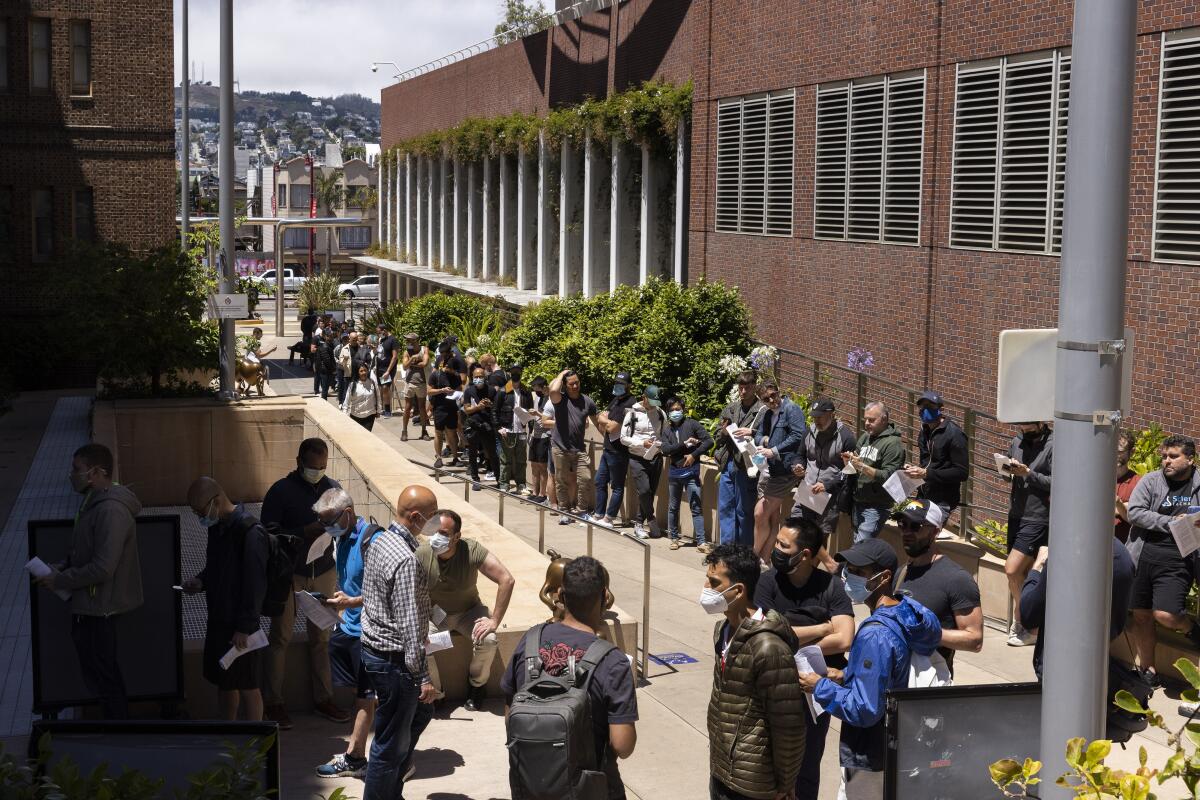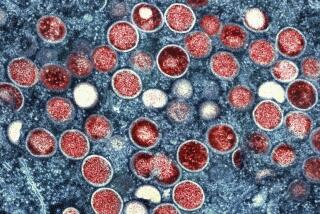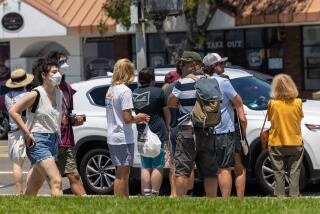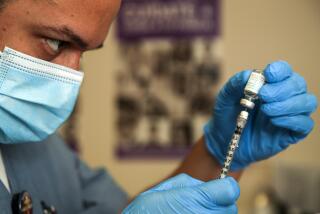Will California or Los Angeles declare monkeypox a public health emergency?

- Share via
As monkeypox cases continue to rise across California, health officials said they are deploying additional resources to combat the outbreak, but they are not yet ready to declare a public health emergency.
Cases in California are most concentrated in San Francisco and Los Angeles, making up two-thirds of almost 800 confirmed or probable monkeypox cases, according to state data. On Thursday, San Francisco declared a state of emergency as the number of cases there hit 281.
In Los Angeles County, where cases have surpassed 300, the Department of Public Health said Friday that it “continues to evaluate the increasing monkeypox outbreak … and whether a local emergency declaration would further assist the county’s response.”
Case counts in San Francisco, L.A. and the state have all more than doubled in the last two weeks, as the virus continues to spread almost exclusively among gay and bisexual men, as well as transgender and nonbinary people, officials said. San Francisco leaders said the emergency designation will allow them to mobilize more resources and accelerate funding to combat the outbreak.
Dr. Tomás Aragón, California’s public health director, said Friday the statewide agency also continues to assess the monkeypox outbreak but has not made a determination.
“We continue to evaluate and monitor the situation to decide whether we need to declare an emergency to access any additional authority, resources or if we have any regulatory [or] statutory barriers,” he said. “That review is ongoing.”
California is behind only New York in the number of confirmed cases, according to data from the Centers for Disease Control and Prevention, with each far outnumbering any other state’s case count. Late Friday, New York Gov. Kathy Hochul declared a “state disaster emergency.” The World Health Organization last week also declared monkeypox a global emergency.
But Aragón said California has been able to use much of its public health infrastructure established during the COVID-19 pandemic to respond to the monkeypox outbreak, like software for contact tracing, a vaccine registry and a disease surveillance system.
In Los Angeles, officials are responding to the outbreak by “redirecting staff for incident command response, conducting extensive contact tracing, community education and outreach, and implementing a vaccination strategy in line with national guidance while vaccine supply remains limited,” the Public Health Department said.
But many state leaders and LGBTQ advocates worry the response is not enough and have called on state and local leaders to declare a public health emergency.
“As a local government, as a state, you want to show the community that you’re being responsive, that you’re taking this seriously,” said Erick Matos of West Hollywood, who is gay.
“San Francisco, I really do think they’re doing the right thing,” Matos said. “Treat it early on and address it early on, versus waiting for cases and community spread to be out of control.”
On Friday, Los Angeles County reported 306 cases, up from 279 the day prior. All but one of the cases had occurred in men, 90% of whom identified as LGBTQ, according to demographic data reported by the county.
Two-thirds of the people infected in L.A. were ages 30 to 49, and almost 40% identified as either white or Latino/Hispanic. More than 50% of cases were reported in a region that includes West Hollywood, downtown, Highland Park and Los Feliz.
Public health officials continue to stress that monkeypox can spread to anyone, regardless of gender or sexual orientation, through close skin-to-skin contact or on sheets or towels that have touched the virus, and sometimes through respiratory droplets. Though not a sexually transmitted disease, monkeypox can easily spread during sexual encounters, experts say.
Aragón said the 786 confirmed and probable cases in California have occurred across 27 different counties. As of Friday, 11 people had been hospitalized with the virus, but he said no one in the state has died.
This strain of monkeypox is rarely fatal, experts have said, and the available vaccines and treatments are considered effective — though they remain in short supply.
San Francisco Mayor London Breed declares a state of emergency Thursday over monkeypox outbreak.
“We continue to approach monkeypox with the utmost urgency to slow it spreading California, distributing scarce vaccine doses to impacted communities, providing prevention information and testing and doing what we can do to increase access to treatment,” Aragón said.
The state has requested up to 800,000 more doses of the Jynneos vaccine, but Aragón said the next shipment, which is expected “soon,” will include only 72,000 doses.
“We’ve communicated to the federal government that we need more vaccine,” Aragón said. To date, the state has received about 38,000 doses, of which 25,000 have been sent to local public health departments and mobile vaccine clinics, he said.
Los Angeles County, which receives doses directly from the federal government, has received about 24,000 doses, almost 60% of which have been administered, according to the county. Aragón said Friday that L.A. can expect an additional 48,000 doses in the next shipment.
Public health officials have continued to call L.A. County’s supply of vaccines “extremely limited.”
Two county supervisors said Friday that declaring an emergency remains a possibility, but neither gave a possible timeline or parameters for such a decision.
“We are reviewing if declaring a local public health emergency would strengthen our local response, but it is clear that the supply of the one thing people are clamoring for — vaccine doses — is not under our control,” Supervisor Sheila Kuehl said in a statement. “We know the [federal government is] trying to increase the supply of vaccines, but in the meantime we could use more funding to provide for outreach and engagement services to better protect our vulnerable populations.”
Supervisor Hilda Solis said that even without an emergency declaration, county officials are taking steps to respond to the outbreak, including this week passing a resolution to urge the federal government to ramp up vaccine production and distribution and also granting the Public Health Department more authority to quickly respond to the virus.
“I am exploring all options that we can take to curb the spread here, including a declaration of a local public health emergency,” Solis said in a statement. “I want to assure our residents that we are taking this public health risk very seriously, and are committed to taking the actions necessary to end this rise in cases.”
More to Read
Sign up for Essential California
The most important California stories and recommendations in your inbox every morning.
You may occasionally receive promotional content from the Los Angeles Times.











